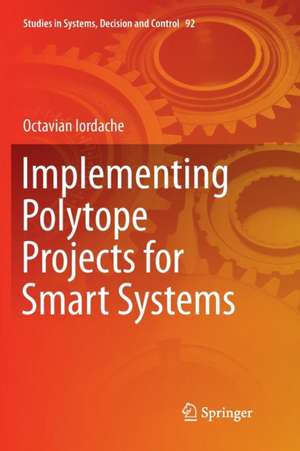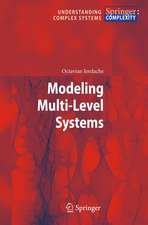Implementing Polytope Projects for Smart Systems: Studies in Systems, Decision and Control, cartea 92
Autor Octavian Iordacheen Limba Engleză Paperback – 13 iul 2018
In light of the fact that devices, tools, methodologies and organizations based on electronics and information technology for automation, specific to the third industrial revolution, are increasingly reaching their limits, it is essential that smart systems be implemented in industry. Polytope projects facilitate the utilization of smart systems and structures as key elements of the fourth industrial revolution.
The book begins by presenting polytope projects as a reference architecture for cyber-physical systems and smart systems, before addressing industrial process synthesis inChapter 2. Flow-sheet trees, cyclic separations and smart configurations for multi-component separations are discussed here. In turn, Chapter 3 highlights periodic features for drug delivery systems and networks of chemical reactions, while Chapter 4 applies conditioned random walks to polymers and smart materials structures. Chapter 5 examines self-assembly and self-reconfiguration at different scales from molecular to micro systems. Smart devices and technologies are the focus of chapter 6. Modular micro reactor systems and timed automata are examined in selected case studies. Chapter 7 focuses on inferential engineering designs, concept-knowledge, relational concept analysis and model driven architecture, while Chapter 8 puts the spotlight on smart manufacturing, industry 4.0, reference architectures and models for new product development and testing. Lastly, Chapter 9 highlights the polytope projects methodology and the prospects for smart systems and structures.
Focusing onprocess engineering and mathematical modeling for the fourth industrial revolution, the book offers a unique resource for engineers, scientists and entrepreneurs working in chemical, biochemical, pharmaceutical, materials science or systems chemistry, students in various domains of production and engineering, and applied mathematicians.
| Toate formatele și edițiile | Preț | Express |
|---|---|---|
| Paperback (1) | 641.16 lei 6-8 săpt. | |
| Springer International Publishing – 13 iul 2018 | 641.16 lei 6-8 săpt. | |
| Hardback (1) | 647.28 lei 6-8 săpt. | |
| Springer International Publishing – 6 feb 2017 | 647.28 lei 6-8 săpt. |
Din seria Studies in Systems, Decision and Control
- 18%
 Preț: 937.89 lei
Preț: 937.89 lei - 18%
 Preț: 729.53 lei
Preț: 729.53 lei - 20%
 Preț: 627.40 lei
Preț: 627.40 lei - 15%
 Preț: 644.18 lei
Preț: 644.18 lei - 18%
 Preț: 900.80 lei
Preț: 900.80 lei - 18%
 Preț: 947.35 lei
Preț: 947.35 lei - 20%
 Preț: 1467.93 lei
Preț: 1467.93 lei - 15%
 Preț: 646.30 lei
Preț: 646.30 lei - 18%
 Preț: 1012.84 lei
Preț: 1012.84 lei - 15%
 Preț: 653.33 lei
Preț: 653.33 lei - 9%
 Preț: 655.01 lei
Preț: 655.01 lei - 20%
 Preț: 835.23 lei
Preț: 835.23 lei - 18%
 Preț: 1112.30 lei
Preț: 1112.30 lei - 20%
 Preț: 934.24 lei
Preț: 934.24 lei - 24%
 Preț: 726.59 lei
Preț: 726.59 lei - 18%
 Preț: 1004.81 lei
Preț: 1004.81 lei - 20%
 Preț: 924.72 lei
Preț: 924.72 lei - 18%
 Preț: 1010.48 lei
Preț: 1010.48 lei - 20%
 Preț: 932.21 lei
Preț: 932.21 lei - 18%
 Preț: 1007.35 lei
Preț: 1007.35 lei - 18%
 Preț: 752.43 lei
Preț: 752.43 lei - 18%
 Preț: 1000.24 lei
Preț: 1000.24 lei - 18%
 Preț: 999.45 lei
Preț: 999.45 lei - 18%
 Preț: 1016.81 lei
Preț: 1016.81 lei - 18%
 Preț: 949.73 lei
Preț: 949.73 lei - 18%
 Preț: 1119.38 lei
Preț: 1119.38 lei - 18%
 Preț: 1412.20 lei
Preț: 1412.20 lei - 20%
 Preț: 1163.21 lei
Preț: 1163.21 lei - 18%
 Preț: 1116.26 lei
Preț: 1116.26 lei - 18%
 Preț: 783.20 lei
Preț: 783.20 lei - 18%
 Preț: 952.09 lei
Preț: 952.09 lei - 20%
 Preț: 1472.54 lei
Preț: 1472.54 lei - 18%
 Preț: 1392.46 lei
Preț: 1392.46 lei - 20%
 Preț: 1180.52 lei
Preț: 1180.52 lei - 18%
 Preț: 1567.67 lei
Preț: 1567.67 lei - 20%
 Preț: 984.18 lei
Preț: 984.18 lei - 20%
 Preț: 369.86 lei
Preț: 369.86 lei - 20%
 Preț: 1281.17 lei
Preț: 1281.17 lei - 18%
 Preț: 1582.67 lei
Preț: 1582.67 lei - 18%
 Preț: 1112.30 lei
Preț: 1112.30 lei - 20%
 Preț: 1055.94 lei
Preț: 1055.94 lei - 18%
 Preț: 1405.90 lei
Preț: 1405.90 lei - 18%
 Preț: 961.55 lei
Preț: 961.55 lei - 20%
 Preț: 1053.48 lei
Preț: 1053.48 lei - 20%
 Preț: 1049.37 lei
Preț: 1049.37 lei - 18%
 Preț: 1005.74 lei
Preț: 1005.74 lei - 18%
 Preț: 1225.94 lei
Preț: 1225.94 lei - 18%
 Preț: 1232.26 lei
Preț: 1232.26 lei
Preț: 641.16 lei
Preț vechi: 801.45 lei
-20% Nou
Puncte Express: 962
Preț estimativ în valută:
122.68€ • 128.44$ • 101.51£
122.68€ • 128.44$ • 101.51£
Carte tipărită la comandă
Livrare economică 08-22 aprilie
Preluare comenzi: 021 569.72.76
Specificații
ISBN-13: 9783319849331
ISBN-10: 3319849336
Ilustrații: XXI, 185 p. 139 illus. in color.
Dimensiuni: 155 x 235 mm
Greutate: 0.3 kg
Ediția:Softcover reprint of the original 1st ed. 2017
Editura: Springer International Publishing
Colecția Springer
Seria Studies in Systems, Decision and Control
Locul publicării:Cham, Switzerland
ISBN-10: 3319849336
Ilustrații: XXI, 185 p. 139 illus. in color.
Dimensiuni: 155 x 235 mm
Greutate: 0.3 kg
Ediția:Softcover reprint of the original 1st ed. 2017
Editura: Springer International Publishing
Colecția Springer
Seria Studies in Systems, Decision and Control
Locul publicării:Cham, Switzerland
Cuprins
Introduction.- Processes Synthesis.- Molecules and Networks.- Conditioned Walks.- Assembling and Configuring.- Devices and Technologies.- Concepts and Knowledge.- Industrial Systems.- Polytope Perspectives.- Appendices.- Index.
Textul de pe ultima copertă
This book presents a domain of extreme industrial and scientific interest: the study of smart systems and structures. It presents polytope projects as comprehensive physical and cognitive architectures that support the investigation, fabrication and implementation of smart systems and structures. These systems feature multifunctional components that can perform sensing, control, and actuation.
In light of the fact that devices, tools, methodologies and organizations based on electronics and information technology for automation, specific to the third industrial revolution, are increasingly reaching their limits, it is essential that smart systems be implemented in industry. Polytope projects facilitate the utilization of smart systems and structures as key elements of the fourth industrial revolution.
The book begins by presenting polytope projects as a reference architecture for cyber-physical systems and smart systems, before addressing industrial process synthesis inChapter 2. Flow-sheet trees, cyclic separations and smart configurations for multi-component separations are discussed here. In turn, Chapter 3 highlights periodic features for drug delivery systems and networks of chemical reactions, while Chapter 4 applies conditioned random walks to polymers and smart materials structures. Chapter 5 examines self-assembly and self-reconfiguration at different scales from molecular to micro systems. Smart devices and technologies are the focus of chapter 6. Modular micro reactor systems and timed automata are examined in selected case studies. Chapter 7 focuses on inferential engineering designs, concept-knowledge, relational concept analysis and model driven architecture, while Chapter 8 puts the spotlight on smart manufacturing, industry 4.0, reference architectures and models for new product development and testing. Lastly, Chapter 9 highlights the polytope projects methodology and the prospects for smart systems and structures.
Focusing onprocess engineering and mathematical modeling for the fourth industrial revolution, the book offers a unique resource for engineers, scientists and entrepreneurs working in chemical, biochemical, pharmaceutical, materials science or systems chemistry, students in various domains of production and engineering, and applied mathematicians.
In light of the fact that devices, tools, methodologies and organizations based on electronics and information technology for automation, specific to the third industrial revolution, are increasingly reaching their limits, it is essential that smart systems be implemented in industry. Polytope projects facilitate the utilization of smart systems and structures as key elements of the fourth industrial revolution.
The book begins by presenting polytope projects as a reference architecture for cyber-physical systems and smart systems, before addressing industrial process synthesis inChapter 2. Flow-sheet trees, cyclic separations and smart configurations for multi-component separations are discussed here. In turn, Chapter 3 highlights periodic features for drug delivery systems and networks of chemical reactions, while Chapter 4 applies conditioned random walks to polymers and smart materials structures. Chapter 5 examines self-assembly and self-reconfiguration at different scales from molecular to micro systems. Smart devices and technologies are the focus of chapter 6. Modular micro reactor systems and timed automata are examined in selected case studies. Chapter 7 focuses on inferential engineering designs, concept-knowledge, relational concept analysis and model driven architecture, while Chapter 8 puts the spotlight on smart manufacturing, industry 4.0, reference architectures and models for new product development and testing. Lastly, Chapter 9 highlights the polytope projects methodology and the prospects for smart systems and structures.
Focusing onprocess engineering and mathematical modeling for the fourth industrial revolution, the book offers a unique resource for engineers, scientists and entrepreneurs working in chemical, biochemical, pharmaceutical, materials science or systems chemistry, students in various domains of production and engineering, and applied mathematicians.
Caracteristici
Presents the study of smart systems and structures Presents polytope projects as comprehensive physical and cognitive architectures allowing the investigation, fabrication, and implementation of smart systems and structures Demonstrates how smart systems can be implemented in industry, in light of the fact that the devices, tools, methodologies and organizations based on electronics and information technology for automation are now reaching their limits Includes supplementary material: sn.pub/extras
















